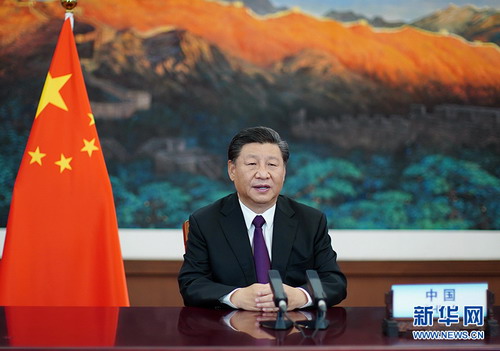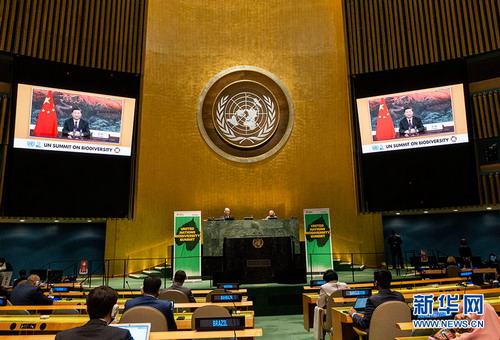
The People’s Republic of China



On September 30, 2020, President Xi Jinping delivered an important speech via video at the United Nations Summit on Biodiversity.
Xi Jinping stressed that at the special moment that the UN celebrates its 75th anniversary and all countries devoted to the fight against COVID-19 and high-quality economic resurrection, the UN Summit on Biodiversity is of both practical and far-reaching significance to discuss the important issues of protecting biodiversity and promoting sustainable development.
Xi Jinping pointed out, the survival and development of human beings are threatened by the biodiversity loss and ecosystem degradation resulted from faster extinction of species. The COVID-19 pandemic teaches us that men and nature are a community of shared destiny. We should make concerted efforts to advance preservation and development side by side, and create a better home for the coexistence of all things.
Xi Jinping gave four proposals:
First, adhering to ecological preservation and enhancing the motivation to create a beautiful world. Biodiversity is a critical basis for human survival and development. The ecological prosperity leads to civilization prosperity. From the perspective of being responsible for human civilization, we should respect, adapt to and protect the nature, explore the pathway to harmonious coexistence between men and nature, promote the coordination of economic development and ecological preservation, and jointly build a prosperous, clean and beautiful world.
Second, adhering to multilateralism and gathering the joint force of world environmental governance. The international conventions such as the Convention on Biological Diversity, the United Nations Framework Convention on Climate Change and the Paris Agreement, supported and participated by all parties, are the legal basis for environmental governance and the important achievements of multilateral cooperation. Confronted with the global environmental risks and challenges, all countries are to form a community of share destiny. Unilateralism goes against people's shared aspiration and cooperation is the right way. We should firmly protect the UN-cored international system, safeguard the dignity and authority of international rules, and improve the level of global environmental governance.
Third, maintaining green development and incubating the vitality for high-quality economic resurrection in the post-pandemic era. We should take a farsighted view and keep focusing on green, inclusive and sustainable development. We should try to find development opportunities in the protection of nature, and ensure both ecological preservation and high-quality economic development.
Fourth, enhancing the sense of responsibility and the capability to cope with environmental challenges. The developed countries and the developing countries are in different stages of development, thus have different historical responsibilities and practical capabilities towards environmental issues. We should persist in the principle of common yet differentiated responsibilities, and give consideration to the fund, technology and capacity building concerns of the developing countries. We should earnestly fulfill the commitments and turn the targets into reality.

Xi Jinping also stressed that China gives top priority to and makes ecological preservation the guiding principle for its development, and adopts effective policies and actions to this regard. Over the past decade, China saw 70 million hectares of forests, ranking first in the world. China leads the world in the collection and preservation of biogenetic resources thanks to its long-term and large-scale desert control and effective wetland preservation. 90 percent of terrestrial ecosystems and 85 percent of key wildlife populations are effectively preserved. China actively participates in global environmental governance and honestly fulfills its obligations to climate change and biodiversity specified in environmental-related treaties. It has completed the 2020 targets of responding to climate change and establishing natural reserves ahead of schedule. China will uphold the philosophy of a community of shared future for mankind, assume the international responsibility appropriate to its development level, and make more independent contributions. China will adopt more vigorous policies and measures to reach CO2 emission peak value by 2030 and carbon neutrality by 2060, aiming to give greater supports to the targets set by the Paris Agreement on climate change.
Xi Jinping concluded that China will host the Convention on Biological Diversity (COP15) in Kunming, Yunnan Province next year. "I want to welcome you to Kunming to discuss and draw up plans together for protecting global biodiversity. Now, let us proceed from this Summit and work in concert to build a beautiful world of harmony among all beings on the planet."


